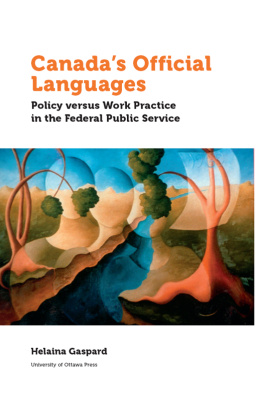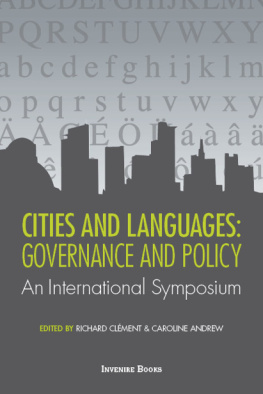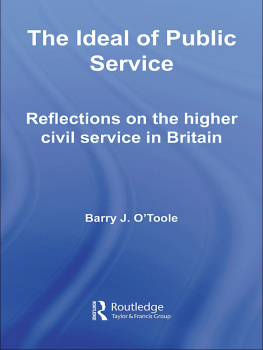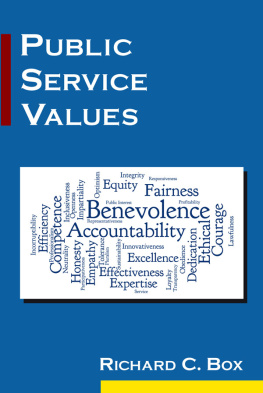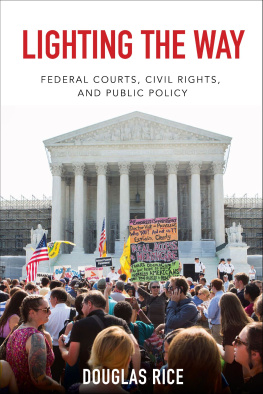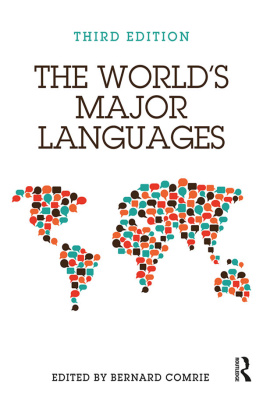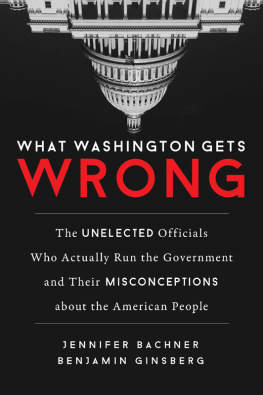The University of Ottawa Press (UOP) is proud to be the oldest of the francophone university presses in Canada and the only bilingual university publisher in North America. Since 1936, UOP has been enriching intellectual and cultural discourse by producing peer-reviewed and award-winning books in the humanities and social sciences, in French of in English.
The University of Ottawa Press gratefully acknowledges the support extended to its publishing list by the Government of Canada, the Canada Council for the Arts, the Ontario Arts Council, and the Federation for the Humanities and Social Sciences through the Awards to Scholarly Publications Program and by the University of Ottawa.
Library and Archives Canada Cataloguing in Publication
Gaspard, Helaina, 1986-, author
Canadas official languages : policy versus work practice in the federal public service / Helaina Gaspard.
(Politics and public policy)
Includes bibliographical references and index.
Issued in print and electronic formats.
ISBN 978-0-7766-2335-1 (softcover).--ISBN 978-0-7766-2337-5 (PDF).-
ISBN 978-0-7766-2336-8 (EPUB).--ISBN 978-0-7766-2338-2 (Kindle)
1. Language policy--Canada. 2. Canada--Officials and employees--Language. 3. Canada--Languages--Law and legislation. 4. Canada. Official Languages Act. 5. Canada. Official Languages Act (1988). I. Title.
P119.32.C3G37 2019 | 353.70971 | C2018-906574-5
C2018-906575-3 |
Legal Deposit: 2019
Library and Archives Canada
University of Ottawa Press 2019
Printed and bound in Canada
Copy editing: | Michael Waldin |
Proofreading: | Susan James |
Typesetting: | CS |
Cover design: | Chemin parcourir by/par Paulette Foulem, 1969, Oil on canvas/huile sur toile, 30 x 36. Reproduced with kind permission of the artist, Paulette Foulem, and Uni Coopration Financire. |
by Graham Fraser
C anadas language policies have a history of paradoxes and contradictions.
When Lester Pearson announced in 1966 that it would be the policy of the government to ensure that public servants could speak the official language of their choice in the knowledge that they would be understood, he also said that unilingual public servants would not lose their jobs.
When Pierre Trudeaus policies of bilingualism were under attack, he responded by stressing that no one was being compelled to learn French. And when Joe Clark was at an all-candidates meeting in his Alberta constituency, and one person after another attacked federal bilingualism policies, he reacted by asking everyone in the room who had been required to learn French in order to do their jobs to raise their hand. His was the only hand in the air.
The key to the paradox is the fact that Canada comprises two largely unilingual language communities living side by side: a majority of English-speaking Canadians do not speak French, and a majority of French-speaking Canadians do not speak English.
The key bridge between these unilingual islands is the federal government, and much of the effort that the federal government has invested in language programs has been devoted to trying to make sure that federal employees can work, and serve Canadians, in English or French.
As Helaina Gaspard demonstrates, this has been a challenge throughout Canadas history. Canadas first century saw severe limitations on language rights, which, as she says, were confined to the political and judicial realms of the state through section 133 of the British North America Act. There were no language rights for citizens, nor were there any guarantees that they could receive services from the federal administration in their language of choice.
The debate over language rights in general and language of work in particular really began in the 1960s, with the Royal Commission on Bilingualism and Biculturalism, Pearsons response to the surge in Quebec nationalism, and the 1969 Official Languages Act.
Gaspard identifies another paradox. When the Act was the responsibility of the Department of the Secretary of State, there was little co-ordination or authority; departments tend not to take direction from their colleagues. But when Treasury Board took control of the policy, managers in departments became even more alienated from the idea of implementing the program.
The 1969 Act did not mention language of work, but the first Commissioner of Official Languages, Keith Spicer, acted as if it did, stretching the scope and interpretation of the Act. In 1988, the Act specifically dealt with the rights of public servants to work in the official language of their choice in districts that were designated bilingual.
The decision to grant employees the right to work in their language of choice in the 1988 version of the Official Languages Act was radical. Employees had the power to write, speak, and be evaluated in their language of choiceand it became the responsibility of their managers to respect that right.
However, human nature being what it is, many employees have been hesitant to speak French (or English in Quebec) at meetings when they know some of their colleagues will have trouble understanding them, or to insist that their manager do their annual appraisal in French (again, the reverse applies in Quebec) if he or she is uncomfortable in the language.
Gaspard traces the evolution of the ongoing challenge of ensuring that minority language rights are respected, and how successive federal governments have negotiated the landmines of fragile national unity and fractious labour relations.
The problem remains intact. A 2017 study by Patrick Borbey and Matthew Mendelssohn entitled The Next Level: Normalizing a Culture of Inclusive Linguistic Duality in the Federal Public Service Workplace found that
too many public servants working in bilingual regions do not feel comfortable using their language of choice in their workplace; some managers do not demonstrate a good ability to work with their employees in the language of their choice; some public servants have difficulty meeting and maintaining the language requirements of their positions; some public servants see official language requirements as a barrier to hiring and/or promotion; meetings sometimes fail to facilitate the use of both official languages; the Public Service could better take advantage of new technologies to support the learning and use of official languages; and leaders do not always lead by example.
That is the state of the language of work in the current federal administration. Helaina Gaspard explains how that came to be. The result is a valuable contribution to the literature of language policy and public administration.
Graham Fraser is a Visiting Assistant Professor (Professional) at the McGill Institute for the Study of Canada and a Senior Fellow at the Graduate School of Public and International Affairs at the University of Ottawa. He was Commissioner of Official Languages from 2006 to 2016

